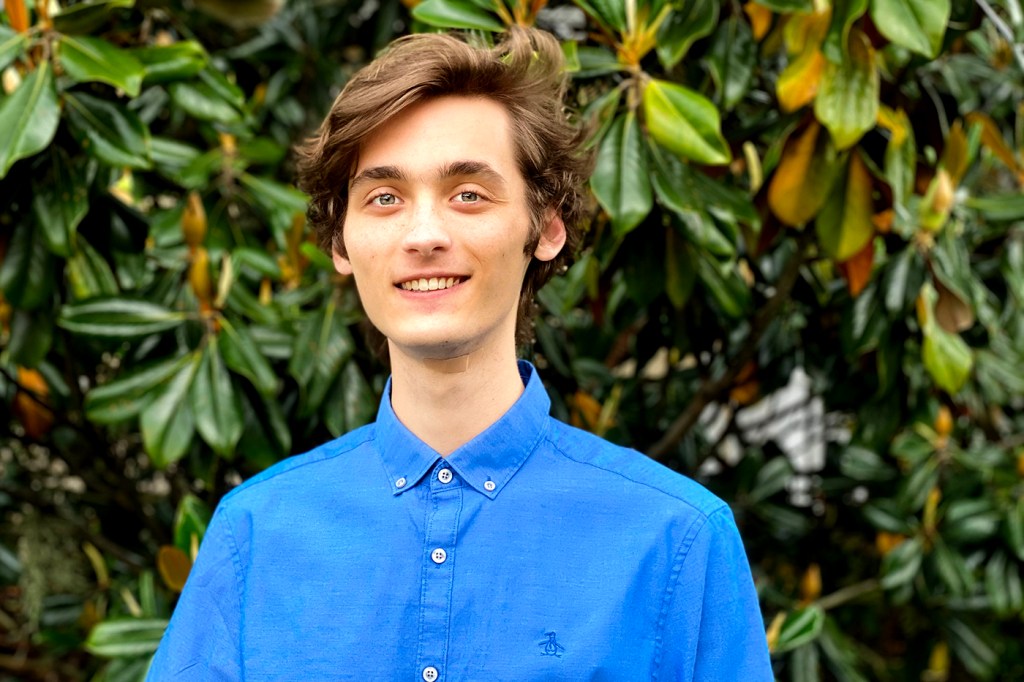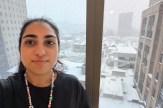He grew up hacking video games. Now he’s tackling complex math.

Max Daniels loves problems. The more complex, the better. It just so happened that last spring, he encountered the hardest math problem he has ever faced.
The quandary concerned using hemisphere caps to cover a sphere, or as he described it, “like trying to place a few new suns to light the entire earth.” The problem was so intricate, he says he spent days and nights obsessing over it.
For three months, Daniels, a second-year student of mathematics and computer science at Northeastern, and his friends tried different approaches to solving the puzzle, constructing counterexamples and jotting down their observations.
“Math is not an experimental science, but we approached it experimentally: We drew sharpie hemispheres on oranges to categorize various coverings and used each example to test our ideas,” he says.
Then one day, he had the brilliant idea of cutting the oranges in half. The idea, he says, came from reading about the concept of a “decision boundary,” a mathematical boundary that cuts a space in half. It worked.
“I get the most satisfaction from finding creative ways to understanding the structure hidden in complicated systems,” he says.
These types of challenges take up much of Daniels’ time, both inside and outside the classroom. He is as enthusiastic about creating them as he is about solving them, having taught himself programming and math by hacking video games and reading open-source tutorials online growing up in a small town in central Florida. He yearned to become an academic, he says, but wasn’t confident about his prospects.
“I was worried that since I went to an underfunded school and my parents were not researchers, I would never have that chance,” he says.
One of the great conundrums that has preoccupied him as a researcher is how learning models use the structure hidden in natural data, such as in 1- and 2-D signals. Daniels is as keen to understand and build these concepts—whether they involve machine learning, algorithms, or probability—as he is on communicating them to students and peers; he’d like to work in academia, to teach and conduct research in machine learning.
“My priority as an undergraduate is to become a better problem solver, experimentalist, and communicator,” he says. “These foundational strengths will make me an excellent researcher in the future.”
Daniels has been awarded with a Goldwater Scholarship to support his pursuit of a doctoral degree in applied mathematics and research on machine learning. Established by the United States Congress to honor Sen. Barry Goldwater, the Goldwater Scholarship is a highly competitive, merit-based award given to college students who plan to pursue research careers in mathematics, engineering, and the natural sciences.
Receiving the award makes him excited for the future, says Daniels.
“Between my research mentors, letter writers, and the various selection committee members, a lot of professional researchers decided that my work is valuable and promising enough to be honored,” he says. “These are all people I look up to, so their support is really encouraging.”
A budding researcher, Daniels has learned how to systematically understand new machine learning models, while also knowing how to identify phenomena he doesn’t understand, and asking questions that yield evidence for an explanation.
And as a machine learning tutor, Daniels is familiar with the nuances and derivations of basic statistical learning models and how each contrasts from its competitors.
Outside of class, Daniels meets weekly with his mentor, Virgil Pavlu, an associate teaching professor of machine learning, information retrieval, and algorithms, to solve recreational math problems. He is also on the planning committee for Northeastern’s annual 24-hour scavenger hunt, Husky Hunt, for which he contributes puzzles, riddles, and trivia questions.
When he’s not problem solving, Daniels practices wheel-thrown ceramics at Massachusetts Institute of Technology, where he enjoys making pots and bowls, using the latter to keep his biscotti upright in the oven when he’s baking.
He says he plans to continue working with Paul Hand, an assistant professor of mathematics and computer science, and undertake research co-ops in the field of statistics and computer science.
“My co-ops and research work are going to help me decide which labs I want to seek out for graduate school, which is ultimately where I’ll end up long-term,” Daniels says.
For media inquiries, please contact media@northeastern.edu.





